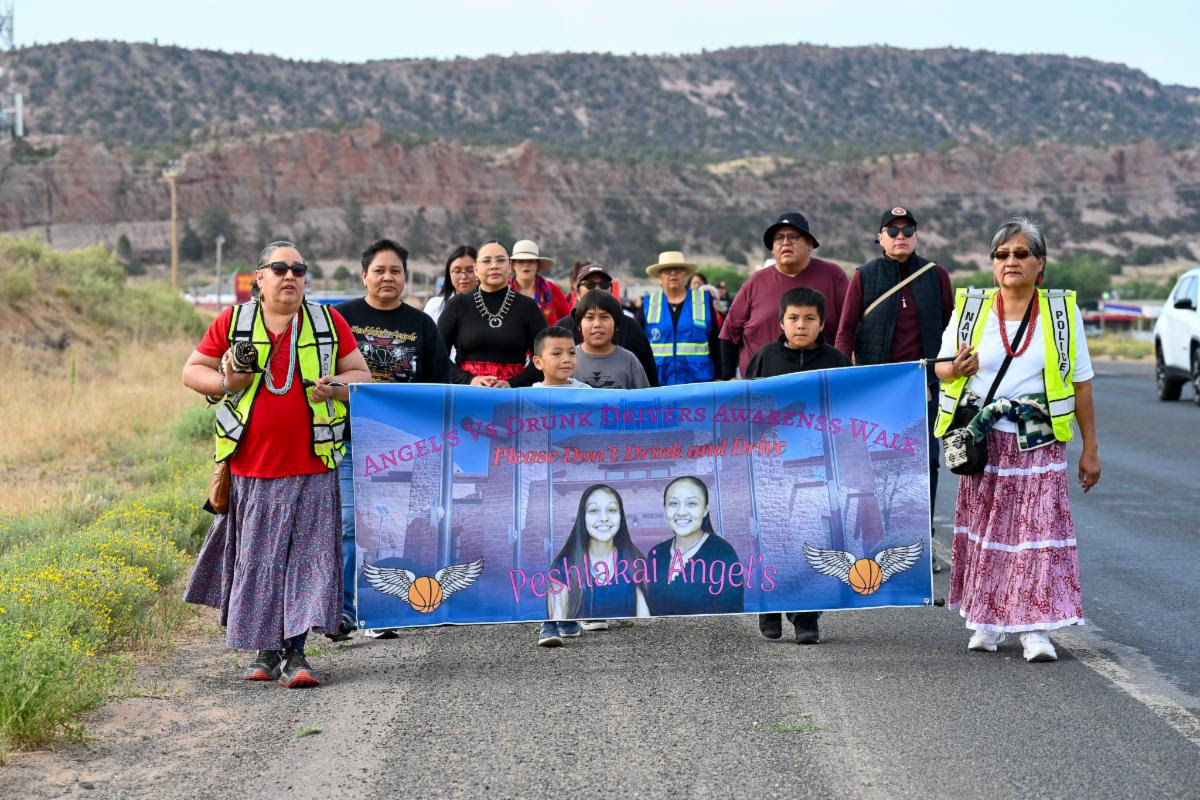
- Details
- By Native News Online Staff
On the first day of the 2025 Summer Council Session, Council Delegates Amber Kanazbah Crotty and Dr. Andy Nez, alongside the Missing and Murdered Diné Relatives (MMDR) Task Force, community leaders, and the Peshlakai family, gathered in solemn unity to honor the lives of DeShauna and Del Lynn Peshlakai. The two sisters were tragically killed by a drunk driver in 2010.
To remember their lives and raise awareness about the ongoing threat of drunk driving across the Navajo Nation, delegates and advocates participated in a memorial walk—Angels vs. Drunk Drivers—from the Navajo Nation Museum to the Council Chamber.
MMDR Task Force Chair Amber Kanazbah Crotty emphasized the Council’s commitment to justice and prevention, stating, “The Peshlakai sisters were vibrant young Diné girls with bright futures. Their deaths were preventable. We owe it to them and to every family impacted by drunk driving to fight for stronger penalties, consistent prosecution, and lasting policy change. We must amend our laws, including Title 17, and ensure our justice system works for our people—not against them.”
Darlene Peshlakai, mother of the Peshlakai sisters, addressed the Council and the public, expressing both sorrow and resolve. “It’s been over fifteen years, but the pain never leaves. We keep walking, showing up, and spreading the message that drunk driving must end. This is not just our fight. It should be everyone’s. We need checkpoints. We need chapter-level engagement. We need the entire Navajo Nation to stand with us and protect our youth.”
Speaker Crystalyne Curley echoed the call for community-wide action. “These issues are painful, but we must talk about them,” she said. “Let’s use our platforms—social media, community forums, and legislative action—to bring visibility and change. We honor the Peshlakai family not just with our words, but with the work we commit to from this moment forward.”
The Angels vs. Drunk Drivers walk was both a tribute to the lives lost and a call to action—reminding all who participated that real change is possible, but only if it is pursued with unity, urgency, and unwavering resolve.
More Stories Like This
Native News Weekly (August 25, 2024): D.C. BriefsNavajo Nation Mourns the Passing of Former Vice President Rex Lee Jim
Deb Haaland Earns Endorsement From Communications Workers of America Local 7076
University Soccer Standout Leads by Example
Two Native Americans Named to Democratic Congressional Campaign Committee's“Red to Blue” Program
Help us defend tribal sovereignty.
At Native News Online, our mission is rooted in telling the stories that strengthen sovereignty and uplift Indigenous voices — not just at year’s end, but every single day.
Because of your generosity last year, we were able to keep our reporters on the ground in tribal communities, at national gatherings and in the halls of Congress — covering the issues that matter most to Indian Country: sovereignty, culture, education, health and economic opportunity.
That support sustained us through a tough year in 2025. Now, as we look to the year ahead, we need your help right now to ensure warrior journalism remains strong — reporting that defends tribal sovereignty, amplifies Native truth, and holds power accountable.
 The stakes couldn't be higher. Your support keeps Native voices heard, Native stories told and Native sovereignty defended.
The stakes couldn't be higher. Your support keeps Native voices heard, Native stories told and Native sovereignty defended.
Stand with Warrior Journalism today.
Levi Rickert (Potawatomi), Editor & Publisher


